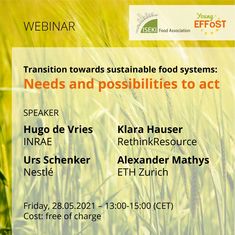Transition towards sustainable food systems: Needs and possibilities to act
All interested participants are kindly invited to participate at the seminar
Transition towards sustainable food systems: Needs and possibilities to act
Friday, 28.05.2021 - 13:00-15:00 (CET) - Cost: free of charge
Registration: https://bokuvienna.zoom.us/meeting/register/tJcudu2tqT8vGdbP84mGqPV-khB4LVOwvyrb
Session Chairs: Felix Schottroff & Lukas Luggin, email: YoungEFFoST@effost.org
Overview on sustainable food systems: where are we now?
Hugo de Vries, INRAE, France
Many concepts and campaigns have been proposed already to reach a higher degree of sustainability for food value chains and its actors. This talk will specify what it means for food systems to evolve sustainably and the impact on future developments in food science and technology.
True value of food as a tool for multinational companies to manage food system sustainability
Urs Schenker, Nestlé, Switzerland
True value approaches allow multinationals to better understand their impacts and dependencies on sustainable food systems. By evaluating a large range of natural, social, and human capital impacts, multinationals can better understand how they can holistically manage their role in sustainable food systems, and understand the benefits that can be achieved by protecting the planet, ensuring health, and improving livelihoods of food system stakeholders.
Circular bioeconomy: A way towards more sustainability?
Klara Hauser, RethinkResource GmbH, Switzerland
In 2016, RethinkResource was founded with the mission to support the producing industry in the transition to a closed loop economy. In this framework, the company acts as a consulting business, innovation agency and circular engineering office, bringing together upcycling innovations from across the world to the European manufacturing and producing industry. As such, RethinkResource has cooperated with numerous renowned food producers and will share some insights in this talk.
Barriers for the transition towards more sustainable food systems and how to overcome them
Alexander Mathys, ETH Zurich, Switzerland
Although many sustainability concepts have been proposed already, there is still a long and winding road ahead of us. In order to be able to overcome barriers to the development for more sustainable food processing and production, the current bottlenecks and challenges will be identified and an outlook towards future developments will be given.
After the presentations, the speakers will be available for a panel discussion involving the audience.

